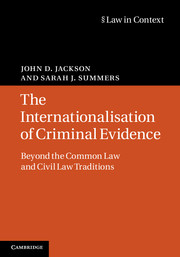Book contents
- Frontmatter
- Contents
- Foreword
- Preface and acknowledgements
- Abbreviations
- Table of international cases
- Part I Evidentiary contexts
- Part II Evidentiary rights
- 6 Fair trials and the use of improperly obtained evidence
- 7 The presumption of innocence
- 8 Silence and the privilege against self-incrimination
- 9 Defence participation
- 10 Challenging witness evidence
- 11 Towards a theory of evidentiary defence rights
- Index
- References
10 - Challenging witness evidence
Published online by Cambridge University Press: 05 June 2012
- Frontmatter
- Contents
- Foreword
- Preface and acknowledgements
- Abbreviations
- Table of international cases
- Part I Evidentiary contexts
- Part II Evidentiary rights
- 6 Fair trials and the use of improperly obtained evidence
- 7 The presumption of innocence
- 8 Silence and the privilege against self-incrimination
- 9 Defence participation
- 10 Challenging witness evidence
- 11 Towards a theory of evidentiary defence rights
- Index
- References
Summary
Introduction
Witnesses, famously said to be the eyes and ears of justice, play a special role in criminal proceedings. Their significance transcends legal systems and is not restricted to a particular type of procedural system or period in the development of a legal system. Although acknowledged across different jurisdictions and times as an important and legitimate basis on which to found a criminal conviction, witness evidence has also traditionally been viewed with suspicion. Witnesses may lie, forget important points, remember things wrongly or simply misinterpret a situation. Witnesses may also be manipulated and their evidence may depend on the questions which they are asked. This explains why witness evidence is not only much discussed, but also separately regulated in the various conventions and constitutional provisions which guarantee the right to a fair trial.
The principal means of regulating witness evidence in modern times is to control the manner in which the evidence is heard and challenged. Notions such as confrontation and cross-examination are thus often characterised in terms of procedural stipulations and defence opportunities: the authorities are required to ensure that the accused is afforded the procedural opportunity to cross-examine, or ‘confront’, witnesses who make incriminatory statements. These principles also have a significant evidential dimension. If an accused is not, or is not sufficiently, afforded the opportunity to challenge the witness evidence, the question arises as to what extent, if at all, that evidence can be used in the determination of the verdict. In some circumstances, it may be necessary to refrain from basing a conviction on untested witness evidence.
- Type
- Chapter
- Information
- The Internationalisation of Criminal EvidenceBeyond the Common Law and Civil Law Traditions, pp. 325 - 366Publisher: Cambridge University PressPrint publication year: 2012



